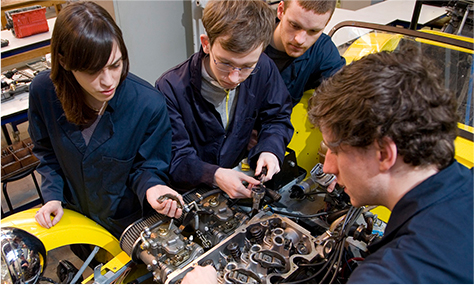How can we help you?
Contact us at the Industrial office nearest to you or submit a business inquiry online.
We are the world class engineering manufacturer providing the highest quality products, services and solutions to our customers.

What is Mechanical Engineering?
Mechanical engineering is a diverse subject that derives its breadth from the need to design and manufacture everything from small individual parts and devices (e.g., microscale sensors and inkjet printer nozzles) to large systems (e.g., spacecraft and machine tools). The role of a mechanical engineer is to take a product from an idea to the marketplace. In order to accomplish this, a broad range of skills are needed

The mechanical engineer needs to acquire particular skills and knowledge. He/she needs to understand the forces and the thermal environment that a product, its parts, or its subsystems will encounter; to design them for functionality, aesthetics, and the ability to withstand the forces and the thermal environment they will be subjected to; and to determine the best way to manufacture them and ensure they will operate without failure. Perhaps the one skill that is the mechanical engineer’s exclusive domain is the ability to analyze and design objects and systems with motion.
- Nemo enim ipsam voluptatem quia voluptas sit aspernatur aut odit
- Nemo enim ipsam voluptatem quia voluptas sit aspernatur aut odit.
- Nemo enim ipsam voluptatem quia voluptas sit aspernatur aut odit
- Nemo enim ipsam voluptatem quia voluptas sit aspernatur aut odit.
Frontiers of research
Since these skills are required for virtually everything that is made, mechanical engineering is perhaps the broadest and most diverse of engineering disciplines
Micron-scale mechanical components such as springs, gears, fluidic and heat transfer devices are fabricated from a variety of substrate materials such as silicon, glass and polymers like SU8. Examples of MEMS components are the accelerometers that are used as car airbag sensors, modern cell phones, gyroscopes for precise positioning and microfluidic devices used in biomedical applications.
Friction stir welding, a new type of welding, was discovered in 1991 by The Welding Institute (TWI). The innovative steady state (non-fusion) welding technique joins materials previously un-weldable, including several aluminum alloys. It plays an important role in the future construction of airplanes, potentially replacing rivets. Current uses of this technology to date include welding the seams of the aluminum main Space Shuttle external tank, Orion Crew Vehicle test article, Boeing Delta II and Delta IV Expendable Launch Vehicles.
Composites or composite materials are a combination of materials which provide different physical characteristics than either material separately. Composite material research within mechanical engineering typically focuses on designing (and, subsequently, finding applications for) stronger or more rigid materials while attempting to reduce weight, susceptibility to corrosion, and other undesirable factors.
Application
Excepteur sint occaecat cupidatat non proident, sunt in culpa qui officia deserunt mollit anim id est laborum. Sed ut perspiciatis unde omnis iste natus error sit voluptatem accusantium doloremque laudantium, totam rem aperiam, eaque ipsa quae ab illo inventore veritatis et quasi architecto beatae vitae dicta sunt explicabo.
Nemo enim ipsam voluptatem quia voluptas sit aspernatur aut odit aut fugit, sed quia consequuntur magni dolores eos qui ratione voluptatem sequi nesciunt. Neque porro quisquam est, qui dolorem ipsum quia dolor sit amet, consectetur, adipisci velit, sed quia non numquam eius modi tempora incidunt ut labore et dolore magnam aliquam quaerat voluptatem.

